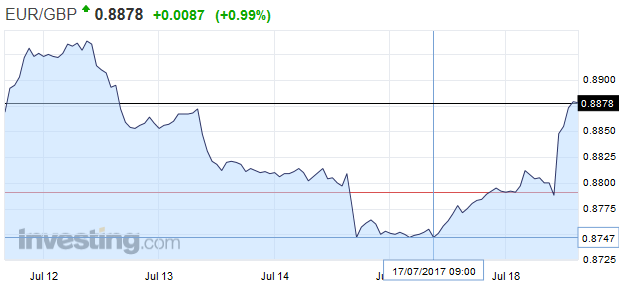Summary: BOE hawk is arguing for a sooner unwind of QE. He did not favor the renewed asset purchases after the referendum. Sterling has been meeting resistance near .30 for past two months. Sterling’s advance today is being attributed to comments by a member of the Bank of England’s Monetary Policy Committee McCafferty. However, we suspect it was a news item that was used to justify the price gains that was already underway. Sterling had been sold to a two-week low early yesterday as BOE Deputy Governor Broadbent confirmed our suspicions that he would side more with Governor Carney than the hawkish wing. Sterling rebounded after the employment report. After reaching almost .2810, sterling recovered
Topics:
Marc Chandler considers the following as important: Bank of England, EUR/GBP, Featured, FX Trends, GBP, newslettersent, reverse QE
This could be interesting, too:
Nachrichten Ticker - www.finanzen.ch writes Die Performance der Kryptowährungen in KW 9: Das hat sich bei Bitcoin, Ether & Co. getan
Nachrichten Ticker - www.finanzen.ch writes Wer verbirgt sich hinter der Ethereum-Technologie?
Marc Chandler writes March 2025 Monthly
Mark Thornton writes Is Amazon a Union-Busting Leviathan?
Summary:
BOE hawk is arguing for a sooner unwind of QE.
He did not favor the renewed asset purchases after the referendum.
Sterling has been meeting resistance near $1.30 for past two months.
Sterling’s advance today is being attributed to comments by a member of the Bank of England’s Monetary Policy Committee McCafferty. However, we suspect it was a news item that was used to justify the price gains that was already underway.
Sterling had been sold to a two-week low early yesterday as BOE Deputy Governor Broadbent confirmed our suspicions that he would side more with Governor Carney than the hawkish wing. Sterling rebounded after the employment report. After reaching almost $1.2810, sterling recovered almost a full cent. Today it set the week’s high of $1.2955.
McCafferty is a hawk. He was part of the dissents in last month’s 5-3 vote to keep rates steady. He had dissented last year, but failed to convince anyone and moved back with the majority. In today’s remarks, he did not say what the BOE would do. He opined on what it should do, which is “think” about reducing its balance sheet.
First, recall that McCafferty opposed the restarting of asset purchases after last year’s referendum. That he wants an early unwind is consistent, but hardly new. Second, McCafferty said other central banks were considering this. Really? Besides the Federal Reserve, which central banks are considering unwinding QE? Try rounding up the suspects, but there aren’t any. No BOJ, No ECB. No SNB. No Riksbank. At most the ECB is talking about changing its forward guidance risk assessment and, we think tapering its purchases but extending them beyond the current time frame (end of the year).
The current position of the BOE is that it will maintain its GBP435 bln holdings of mostly government bonds until interest rate normalization was well under way, which it identifies as nearer 2%. Assuming 25 bp rate hikes, that is seven hikes of the bank rate, which is currently set at 25 bp.
McCafferty does not speak for the central bank, and his views are not consistently reflective of sentiment on the MPC. Moreover, the power of expanding the central bank’s balance sheet seems to lie more with the signaling impact that the actually buying or holding for that matter. This suggests that the market would interpret any hint that the unwind could be brought forward as a signal of a less accommodative stance.
| Sterling’s two-day rally has retraced 61.8% of the decline since peaking near $1.3030 on June 30. That retracement objective was $1.2950. Technical indicators are mixed. For the better part of 2 1/2 months, sterling has stalled a little above $1.30. The $1.3055 level corresponds to a 38.2% retracement of sterling’s decline since the UK referendum. The interest rate differentials between the US and UK (both the ends of the coupon curve) are trending in the sterling’s favor.
The UK reports inflation figures next week and retail sales. While we suspect UK inflation is near a peak, as last year’s oil surge and sterling’s sharp depreciation drops out of base effects, it may be a little early to expect it in the data. On the other hand, retail sales likely contracted for the second consecutive week in June, which would also be the fourth decline in the first six months of the year. Since the market began pricing in Macron’s likely victory in France in mid-April, the euro has rallied 7.6% against sterling to reach almost GBP0.8950 yesterday. However, sterling reversed and saw follow-through action today. A move below GBP0.8800 suggests additional near-term losses. The next immediate target would be near GBP0.8750 and then GBP0.8700. The ECB meets next week, and the market may be reluctant to part with its long euro position ahead of it on the idea that the ECB may again tweak its risk assessment. |
EUR/GBP - Euro British Pound, July 13-17(see more posts on EUR/GBP, ) |
Tags: #GBP,Bank of England,EUR/GBP,Featured,newslettersent,reverse QE

